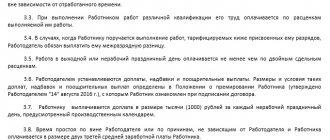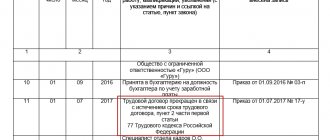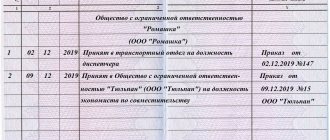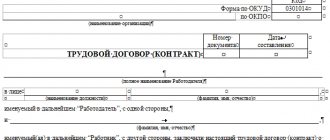Labor legislation on remote work
Remote work assumes that the work performed by the employee is carried out by him in a location other than that created and controlled by the employer. The current edition of the Labor Code of the Russian Federation describes 2 options for such work:
- home-based (Chapter 49), in which the place of work for the employee is defined as his place of residence;
- remote (Chapter 49.1), when the place of work is not established and the employee has the right to choose it himself.
Both options have a lot in common:
- the relationship between a remote employee and an employer is based on the same provisions of the Labor Code of the Russian Federation that apply to ordinary employees, taking into account the peculiarities that arise due to the special nature of remote work;
- the employee may not appear at the employer’s location or visit there occasionally as needed, but is still considered to be at work;
- the time spent on work is not controlled by the employer, and the employee can regulate the periods of work and rest;
- the volume of work assigned to the employee must provide him with the opportunity to comply with the working hours established by law and alternate periods of work and rest;
- the means of labor involved in performing work may belong to both the employee and the employer;
- the employee is entitled to compensation for expenses incurred in the process of performing work, including for the use of property belonging to him;
- the procedure for interaction regarding the transfer of work assignments to the employee and the receipt of work results from him is specifically stipulated;
- for the employer, the list of his responsibilities towards the employee in terms of labor safety issues is limited to providing instructions, providing medical care and the need to investigate an accident with the employee, if one occurs, while he must provide homeworkers with special protective equipment and monitor their working conditions;
- The employment contract may include special grounds for dismissal.
Do you need to keep a time sheet for employees working remotely? Read the article “Do I need to keep a time sheet for a home-based employee?”
Attention! Since 2021, changes to the rules for registration and organization of remote work have come into force. ConsultantPlus experts have prepared a detailed review of the law that amended the Labor Code of the Russian Federation. Get free demo access to K+ and go to the review material to find out all the details of this procedure.
Other conditions
Be sure to cover the following important terms of the working relationship:
- Duration of the agreement. If you specify a specific period, you will get a fixed-term employment contract for remote work. An open-ended agreement is concluded without specifying the validity period.
- Time of work and rest. This condition can be omitted. In this case, the employee determines independently when to work and when to rest.
- Right to vacation. Fix in the agreement the specifics of the provision, duration and payment of the next labor leave.
- Grounds for termination of the contract. List all significant circumstances under which the current agreement will be terminated.
Current form
Differences in relationships with a teleworker and a homeworker
In addition to the generalities, there are a number of significant differences between home and remote work:
- a homeworker is tied to a specific place where work is performed, while a remote worker can perform work in any place convenient for him;
- a homeworker is allowed to involve his family members in the work, while a remote worker does the work himself;
- a home worker creates things of a material nature that require the investment of initial material costs in them, and work of a remote nature leads to the creation of intellectual products;
- working as a homeworker requires direct interaction with the employer when receiving source materials from him (if they are provided by the employer) and transferring finished products to him, and with a remote worker all such interaction is carried out via electronic means of communication;
- For a remote worker, the following may be established: a work schedule agreed with the employer;
- the right to use an enhanced qualified electronic signature of created documents;
- special conditions in terms of labor protection, ensuring the labor process, and providing vacations.
Preparing a contract with an accountant
Another important clause of the contract is the non-disclosure of confidential data. It is recommended to include it even in the employment contract with the deputy chief accountant, since he may also have access to secret information.
As for financial liability, in agreements with employees related to finance, it is prescribed on a par with criminal and administrative liability. However, if the contract is concluded with an assistant or deputy chief accountant, the employer independently determines whether the responsibility will be full or partial.
Part-time work with the possibility of remote work
The Labor Code of the Russian Federation does not contain a ban on remote work for part-time workers. When concluding an agreement on such work with a part-time worker, you should remember the rules established by Chapter. 44 of the Labor Code of the Russian Federation, by virtue of which for a part-time worker:
- working time is defined as half the normal working day, and, accordingly, the amount of work performed by him will be half that of an ordinary employee;
- vacation is granted simultaneously with vacation at the main place of work;
- The guarantees provided to persons: working in the Far North regions do not apply;
- combining work and study;
- termination of the contract is possible with a 2-week notice in case of hiring another employee to perform the same functions, registered at his main place of work.
Read more about the specifics of registering for a part-time job in the material “How to properly register a part-time job according to the Labor Code of the Russian Federation?”
Decor
The contract is drawn up according to the following algorithm:
- a company's personnel officer, individual entrepreneur or human resources specialist authorized by a power of attorney contacts the applicant via the Internet and receives from him copies of the necessary documents (including an application for admission to remote work is required);
- a draft agreement is prepared and endorsed by the director;
- within 3 days, the contract in two copies is sent by registered mail (or by courier) to the employee’s address;
- the employee signs both copies and sends one by registered mail back to the company.
The main compensation for dismissal of pensioners is severance pay. In order for length of service to be taken into account when calculating sick pay, you must work for at least two years. Read more about this here. For delayed wages, the employer is obliged to pay compensation. You will find out how the amount is calculated in our article.
Peculiarities of registration of personnel documents during remote work
Hiring an employee for remote work does not relieve the employer from the obligation to exchange documents with him in order to:
- obtaining from the employee all necessary information about him;
- provision by the employee of originals and copies of documents relevant for employment and further payment of wages;
- drawing up an employment contract signed by both parties and possible additions to it;
- familiarizing the employee with internal regulations against signature;
- receipt by the employee of certificates from the employer.
But if such an exchange with a homeworker can be made through direct contact at the time of receiving materials for work or transferring finished products, then for a remote worker this method is not always available. Therefore, interaction with him and in relation to personnel documents is allowed to be carried out using electronic means of communication. In this case, the documents that the employee must submit to the employer in the original must be sent by regular mail by registered mail with notification.
For other documents, the following electronic exchange options are possible:
- through regular electronic correspondence followed by sending by mail those papers that the employee and (or) employer need to have in the original;
- using electronic documents signed with an enhanced qualified electronic signature, and the recipient must send a response confirmation.
Using electronic documents it is allowed to:
- familiarization with internal regulations;
- filing applications;
- providing explanations.
You can transfer not only a new employee, but also an existing employee, to remote work. In particular, this need for many employers arose due to the COVID-19 epidemic. In order to do this, an additional agreement to the employment contract must be concluded with the employee. ConsultantPlus experts explained in detail what and how to include in such an additional agreement. To do everything correctly, get trial access to the system and go to the Ready solution.
Document function
The employment contract is the basis
relationship between leader and subordinate.
The terms of the agreement must be strictly observed by its parties. If the employer does not comply with the condition, the employee has the right to compensation for losses.
Violation of the terms by an employee can lead to generally accepted negative consequences: a reprimand, a reprimand, or even dismissal.
Without a signed contract, an employee will not be able to prove:
- deception when calculating wages;
- fact of employment.
And the company will not be able to recover losses caused by the employee.
Therefore, the main task of the contract is to secure working conditions and payment for it..
Differences between a contract with a remote employee and a regular employment agreement
An employment contract with a remote worker is mandatory (Article 312.1 of the Labor Code of the Russian Federation). However, the special conditions for remote work and the opportunities provided by current legislation determine the existence of a number of differences between such an agreement and an agreement with an ordinary employee. In a contract with a remote worker:
- an indication of the remote nature of the work is required, and the location of the employer is indicated as the place of conclusion of the contract;
- there is a condition about not registering a work book, if such an agreement is reached;
- a certain work schedule is established, if this is important for the employer, and a procedure for granting vacations;
- stipulates the need to issue an enhanced qualified electronic signature if such a signature is needed by the employee for work;
- contains a list of technical means and software that the employee must use in his work, if such a clause is necessary, and also provides a list of the means of labor transferred to the employee, if such transfer is carried out by the employer;
- reflects the amount of compensation for the use of property owned by the employee and used to perform remote work, as well as other expenses arising in connection with this work;
- the procedure for exchanging work assignments and the results of their implementation is established;
- additional responsibilities of the employer regarding labor protection issues are determined, if necessary;
- the conditions of dismissal are reflected, supplementing the list of reasons contained in the Labor Code of the Russian Federation, if a decision is made to include them in the text of the document.
Rights and obligations of the parties
Almost all requirements of the Labor Code of the Russian Federation apply to remote employees, but subject to the exceptions provided for in Chapter 49.1 of the Labor Code. This applies to the rights and obligations of employees specified in Art. 21 Labor Code of the Russian Federation. We will not repeat them, since those who wish have the opportunity to familiarize themselves with them in the corresponding article (in addition to the rights and responsibilities of employees, it talks about the rights and responsibilities of employers).
Subscribe to our newsletter
Yandex.Zen VKontakte Telegram
A feature of remote work is that the employee is obliged to comply with labor protection requirements only if he works with equipment and tools that were provided by the employer or recommended by him, which follows from Part 2 of Art. 312.3 Labor Code of the Russian Federation. The employer, in turn, in all cases is responsible for conducting an investigation of accidents and recording occupational diseases, as well as fulfilling the requirements of State Labor Inspectorate officials. In addition, he is obliged to provide compulsory social insurance for employees against industrial accidents and occupational diseases.
It is important to note that in fact the employee is deprived of the right to a workplace, but this cannot be attributed to circumstances that infringe on his labor rights due to the remote nature of work. An essential feature in this case is that the worker’s place of service is not subject to special assessment (SEAT). In addition, due to the possibility of an employee establishing a work schedule on his own, he can overwork, that is, violate his right to normal working conditions, however, due to the peculiarities of remote work, this will not be recognized as a violation.
Employment contract for a remote worker - sample
An employment agreement concluded with a remote worker, like a contract with a regular employee, has a free form, but must contain the mandatory information provided for in Art. 57 of the Labor Code of the Russian Federation, taking into account the features that distinguish remote work from regular work.
For information about what constitutes the content of an employment agreement, read the article “Procedure for concluding an employment contract (nuances).”
A sample employment contract for remote work in 2021 can be viewed on our website.
Documents for employment
The employee is obliged to provide his employer with all the necessary information to conclude an employment agreement. Passport data, insurance certificate - all this information can be sent to the employer in the form of electronic documents.
It is worth noting that the employer has the right to request documentary evidence. In this case, you will have to prepare copies of the documents, notarize them and send them by registered mail.
Send the original work book by post. The parties may agree that no entries will be made in the labor record. In this case, the insurance experience will be confirmed by a signed remote employment contract. But if remote work for a hired specialist is the first official employment, then the responsibility for obtaining an insurance certificate (SNILS) falls on the employee himself.
Results
The labor legislation of the Russian Federation allows for the possibility of working outside the location of the employer.
Such work has two varieties (home-based and remote), which have both common features that distinguish this work from ordinary work and their own characteristics. Remote work is distinguished by the predominance of electronic forms of interaction and the possibility of not filling out a work book. An employment contract with a remote worker is drawn up in the usual manner, but with the inclusion of provisions in its text that require agreement between the employee and the employer due to the special nature of the work. You can find more complete information on the topic in ConsultantPlus. Free trial access to the system for 2 days.
Rules for registering remote work in 2021 in the work book
The procedure for working with work books has undergone major changes. By the end of 2021, all employees have decided on the type of work report - paper or electronic.
- If the employee chooses the ETC, a record is made in his paper document that he has submitted an application to maintain information about his work activities in digital format. The document is handed over to him.
| Example of a labor record The employee submitted an application for the employer to provide him with information about his work activity in accordance with Article 66.1 of the Labor Code of the Russian Federation. |
- The employee chose the paper option - no entry is made in his work book. The employer maintains a paper document and simultaneously transmits information in electronic form about his employment to the Pension Fund of the Russian Federation using the SZV-TD form.
Thus, if a new employee presents a work book when applying for a remote work assignment, you will immediately understand in what form it should be kept by the presence or absence of a corresponding entry. In addition, information about the employee’s choice is reflected in his personal account and in the Pension Fund statement, which you have the right to request.
| Advice Don’t forget to warn employees who have switched to digital data not to lose or destroy paper work records. Information about work experience until 2021 is contained only in a paper book. |
If an employee remains silent without making a choice, his activities continue to be reflected both electronically and in traditional form. He also provides the new employer with a paper work report. As for further choices:
- for an employee who takes a remote job for the first time after January 1, 2021, information about work activity is maintained only in electronic form;
- when choosing a paper document, the employee does not lose the right to make a reverse choice at any time;
- When choosing an ETC, returning to paper is not possible;
- the employee did not have the opportunity to make a choice for objective reasons (prolonged illness, etc.) - this right is retained by him;
- your employee is silent, in this case you continue to keep a paper work book and submit information to the Pension Fund electronically. If this employee quits, he goes to the new employer also with a paper document.
| Important! The above also applies to the new rules for registering remote workers from 2021 who are already working for you under an employment contract. |
There is no clear interpretation yet of what to do with the silent ones - whether they will still have the right to switch to the ETC after January 2021 or not. However, given the Pension Fund’s tendency to digitalize document flow, they will most likely retain this right.
Thus, when a remote worker sends you a work report, you enter information into it if:
- he asked you about it;
- he did not choose ETC.
According to the new rules for registering remote work, you are not required to register a remote employee in the individual accounting system if he is not registered with the Pension Fund of Russia. Remote workers themselves apply to the fund with a passport.






